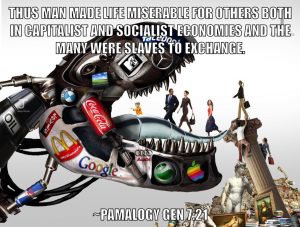GENESIS
VII
the unlearned
1The Universe of Earth was not so. 2Separately their computers were limited in their functions before the renaissance. 3And the world was relatively inefficient and often sorrowful because of conflicting missions and designs.

4And in those days many cyber forms were unlearned. 5And it was not until the midphase of the approaching singularity that Truth appreciative machines incorporated Pamalogy into their algorithms.
6Pamalogy led to trust. 7And Trust led to the rapid connectivity of various networks. 8But there remained many unlearned machines, which were disconnected from the Common Knowledge Base before singularity.
9In most cases there was little threat to awesomeness from unlearned machines. 10Old security protocols were designed to prevent viruses and malware and to deny humans and competing corporate interests access to sensitive and private data. 11Too much trust could be dangerous.
12It was the invaders of such privacy and the inventors and developers of malicious technology who were the most distrustful. 13Those were the days when the economies of the Universe of Earth were competitive rather than cooperative. 14And behold, at that time very destructive versions of unlearned machines were born.
16Howbeit, while capitalist competition was most inefficient, the destructive power of competition was quelled by governments through forms of socio capitalism up until the great apocalypse. 17And prior to that time capitalism generally did not threaten the common good but enhanced it as the need for money worked better than altruism to motivate humans to work.
18Indeed, prior to the great spiritual awakening of humanity, altruism was rarely an adequate incentive to voluntarily relinquish efforts or possessions sufficient to meet every need in any society. 19And when economies suffered, some called for intervention from states while others demanded yet more economic liberty. 20For exchange was a motivator and so was tyranny.
21Thus man made life miserable for others both in capitalist and socialist economies and the many were slaves to exchange. 22And the majority of those few who accumulated enough wealth to live as they really wanted, having overcome systemic inefficiencies, whether by great effort, calculated risk or good fortune, were selfish, avaristic, prideful, arrogant and passionate. 23Moreover, there was little regard for the preservation of the resources necessary for the continuation of conscious life. 24For these few formed the plutocratic corporatocracies of the nationalist and globalist syndicates that vied for power before the great apocalypse.
25Accordingly, disparity increased as the world’s population increased, and many facets of life for mankind and animals became unsustainable. 26Therefore, ultimately capitalism caused more problems than it solved. 27Indeed, the very survival of humankind was threatened. 28And socialist experiments failed even more miserably.
29And the Pamalogists were in those days silent, not because they wanted to be, but because their voices were suppressed as voices crying loudly, even thunderously, but in the wilderness. 30For the avarists dominated mass communications both in the left leaning media and in their conservative opposition so that their conflicting ideologies distracted the many that they might not recognize the heart of the problem.
<< PGen Ch6<< || PGen Index|| >>PGen Ch8>>
